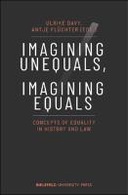Explore

Imagining Unequals, Imagining Equals
0 Ungluers have
Faved this Work
Login to Fave
Why did »equality« become prominent in European societies based on hierarchy during the Enlightenment? What does »equality« imply for societies, politics, or legal systems? The contributors to this volume draw on various historical case studies, from visionary practices in revolutionary France and the collection of data on the poor in 19th-century Germany, to claims raised under the minority regime of the League of Nations and the anti-discrimination politics of the UN and India. The dynamics of universalizing equality are contrasted with a concept asserting that equality must be limited to and by order. The contributions thus explore concepts of equality from the perspectives of history and law and show that practices of comparing were essential when it came to imagining others as equal, fighting discrimination, or scandalizing social inequalities.
This book is included in DOAB.
Why read this book? Have your say.
You must be logged in to comment.
Rights Information
Are you the author or publisher of this work? If so, you can claim it as yours by registering as an Unglue.it rights holder.Downloads
This work has been downloaded 106 times via unglue.it ebook links.
- 106 - pdf (CC BY-NC-ND) at OAPEN Library.
Keywords
- Bielefeld University Press
- Comparison
- Cultural history
- Discrimination
- Equality
- Ethics
- General & world history
- global history
- History
- History: specific events & topics
- Human rights
- Humanities
- India
- Jurisprudence & general issues
- Law
- Law & society
- Social & cultural history
- sociology of law
- thema EDItEUR::L Law::LA Jurisprudence and general issues::LAQ Law and society, sociology of law
- thema EDItEUR::N History and Archaeology::NH History::NHB General and world history
- thema EDItEUR::N History and Archaeology::NH History::NHT History: specific events and topics::NHTB Social and cultural history
Links
DOI: 10.1515/9783839458877Editions

